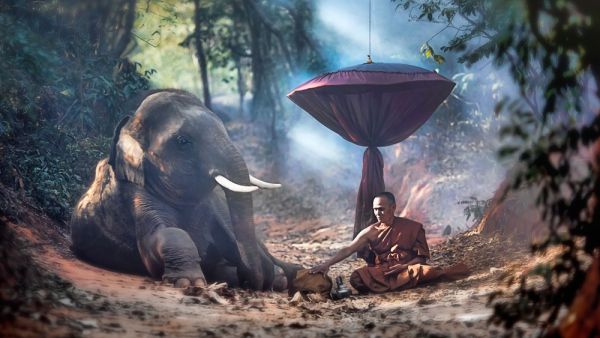The elephant is loved, revered, and respected by people and cultures around the world, yet we balance on the brink of seeing the last of this magnificent creature.
On August 12, 2012, the inaugural World Elephant Day was launched to bring attention to the urgent plight of Asian and African elephants.
1940: ???????? 3M
— UNESCO ?️ #Education #Sciences #Culture ??? (@UNESCO) August 12, 2021
1980: ???? 1.5M
2021: ? 444K
This #WorldElephantDay, let us all reflect on the importance of protecting & preserving #biodiversity. We must act #ForNature now. pic.twitter.com/GKNrgSXtdG
According to the World Elephant Society, "It is a day to honor elephants, to spread awareness about the critical threats they are facing, and to support positive solutions that will help ensure their survival."
The escalation of poaching, habitat loss, human-elephant conflict, and mistreatment in captivity are just some of the threats to both African and Asian elephants.
The main aim of World Elephant Day is to make people aware of better treatment of captive elephants and against their illegal poaching and trade for ivory.
"World Elephant Day is a rallying call for people to support organizations that are working to stop the illegal poaching and trade of elephant ivory and other wildlife products, protect wild elephant habitat, and provide sanctuaries and alternative habitats for domestic elephants to live freely."
hindustantimes
Today is #WorldElephantDay! ? A day to celebrate these extraordinary gentle giants that need our help. Habitat loss, poaching and human-elephant conflicts have pushed Asian elephants to the brink of extinction. Join our plight to help Cambodian elephants and people coexist. ? pic.twitter.com/t5I3ss80ZY
— Wildlife Warriors (@wildwarriors) August 12, 2021
According to recent data of WWF (World Wide Fund for Nature), there are roughly 440,000 elephants left on the planet. The WWF also revealed that every year around 15,000 elephants are hunted by poachers.
Human activities have had a dramatic impact on elephant populations.
— United Nations (@UN) August 12, 2021
On Thursday's #WorldElephantDay, @UNDP explains how DNA forensics can hold traffickers accountable for their crimes against wildlife, ecosystems, nature -- and all of humanity. https://t.co/qSPBbTbj8e
What can we do to save these ‘gentle giants?
Despite being cultural and religious icons in India, elephants are badly treated by unschooled mahouts. Many elephants fell prey to electrocution, train accidents, poaching, and poisoning.
Elephants are shot by hunters and they die in extreme pain and agony. Because of this, their tribes are damaged which leads to populations decline. They are killed by poachers for their ivory which is used in making tableware, sculptures, jewelry, and Chinese traditional medicines, and other things.
Dorothy Florence Lowakutuk, one of the first elephant female keepers in Reteti Elephant Sanctuary. She speaks to @kayburley at 8:40am about #WorldElephantDay.
— Sky News (@SkyNews) August 12, 2021
? 8:40
? #KayBurley
? Sky 501 / Freeview 233
? Watch live: https://t.co/MTAJy1mRFK
So never buy ivory products. Instead of this think to donate to reputed organizations.
There are many ways through which we can donate to organizations like World Wildlife Fund (WWF), The Elephant Society, Wildlife SOS, and others. These organizations work tirelessly towards the rescue.








